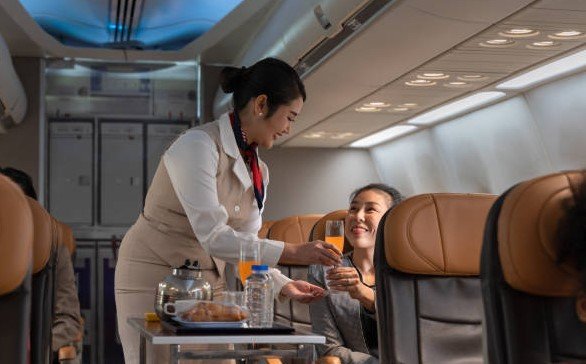Passengers on a United Airlines flight from Newark to Tel Aviv faced an awkward surprise on October 21, 2025, when crew announced that the only in-flight meal option for economy class was ham sandwiches. This decision sparked confusion and discomfort among many travelers, especially those following Jewish dietary laws that prohibit pork.
The incident happened shortly after takeoff on flight 84, leaving passengers without kosher alternatives on a route to Israel, where such rules are common. United Airlines has since addressed the issue, but it raised questions about meal planning on international flights.
What Happened During the Flight
The announcement came right after the plane left Newark Liberty International Airport. Crew members explained that due to an overload of ham sandwiches, no other options were available for the mid-flight meal.
One passenger described the moment as tense but mixed with humor. The crew seemed embarrassed while making the statement over the intercom. They asked anyone unable to eat ham to speak up, but many felt caught off guard on a flight headed to a destination where pork is rarely served.

This was not just a minor glitch. Ham is forbidden in Judaism under kosher rules, and similar restrictions apply in Islam. With Israel home to diverse groups, the choice seemed out of place. The flight, which resumed service after a brief halt earlier in 2025 due to regional tensions, carried a mix of passengers expecting better cultural awareness.
Flight records show United 84 departed on time but the meal issue quickly became the talk of the cabin. No major disruptions occurred, but it highlighted gaps in airline catering.
Passenger Reactions and Stories
Travelers shared a range of responses, from amusement to frustration. Some laughed it off as a simple mistake, while others saw it as a sign of poor planning.
A Jewish passenger noted the irony of serving only ham on a flight to Tel Aviv. They wondered how such an error slipped through, especially on a route popular with religious travelers.
Another person on board mentioned the crew’s discomfort. The announcement led to quiet discussions among seats, with some opting to skip the meal altogether.
Social media buzzed with posts about the event. Users on platforms like Twitter expressed surprise and shared jokes, turning the story viral within hours.
Here are some key reactions gathered from passengers:
- One traveler said the crew handled it professionally but the lack of options felt insensitive.
- A family group chose snacks from their bags instead, avoiding the ham entirely.
- Business passengers in higher classes reported no such issues, pointing to economy-specific problems.
Overall, reactions showed a blend of understanding and calls for better airline practices.
United Airlines’ Response and Actions
United Airlines quickly acknowledged the mishap. A spokesperson stated that the error stemmed from a supply chain mix-up at the Newark hub.
They apologized to affected passengers and offered vouchers for future flights. The airline promised to review meal loading procedures to prevent repeats.
In recent years, United has expanded its kosher meal options on international routes. Data from 2025 shows they serve over 500,000 special meals annually, including kosher and halal choices.
However, this incident occurred amid resumed flights to Tel Aviv after suspensions due to security concerns. United halted services in June 2025 during brief conflicts but restarted in July.
The company has faced similar complaints before. In 2023, a flight diversion happened over unrelated passenger disputes, but meal issues remain rare.
Broader Context in Airline Meal Policies
Airlines often tailor meals to destinations, but errors happen. United’s routes to Israel typically include kosher-certified options to respect local customs.
Industry experts point out that pork-free meals are standard on flights to the Middle East. A 2025 aviation report notes that 70 percent of passengers on such routes request special diets.
This event ties into ongoing discussions about cultural sensitivity in travel. With global tensions, airlines like United aim to build trust through inclusive services.
Compare meal policies across major carriers:
| Airline | Kosher Options on Tel Aviv Routes | Common Meal Issues Reported in 2025 |
|---|---|---|
| United Airlines | Available on request, but stock varies | Supply errors, like the ham incident |
| Delta Air Lines | Standard for all classes | Occasional delays in special requests |
| El Al | Fully kosher across the board | Rare complaints due to focus on dietary laws |
| American Airlines | Pre-order required | Mix-ups with vegetarian and kosher labels |
This table shows United is not alone, but improvements could help.
Recent events include United’s announcement to resume more flights from Chicago and Washington to Tel Aviv starting November 2025. Such expansions highlight the need for reliable meal services.
Why This Matters for Travelers
Incidents like this affect trust in airlines. For frequent flyers to Israel, knowing meals align with dietary needs is key.
It also sparks talks on how airlines handle diverse passengers. In 2025, with travel rebounding post-pandemic, demand for inclusive options has grown by 15 percent, per industry stats.
Passengers can request special meals up to 24 hours before flights. United encourages this through their app or website.
This story reminds travelers to check meal details in advance, especially on long-haul trips.
Looking Ahead and Lessons Learned
United Airlines plans to enhance training for catering teams. Experts suggest better inventory checks to avoid cultural oversights.
As flights to Tel Aviv increase, the airline aims to restore full confidence. With security stable, more routes are set for late 2025.
This incident, while minor, underscores the importance of attention to detail in global travel.
What do you think about this airline mix-up? Share your thoughts in the comments and pass this article along to fellow travelers.
